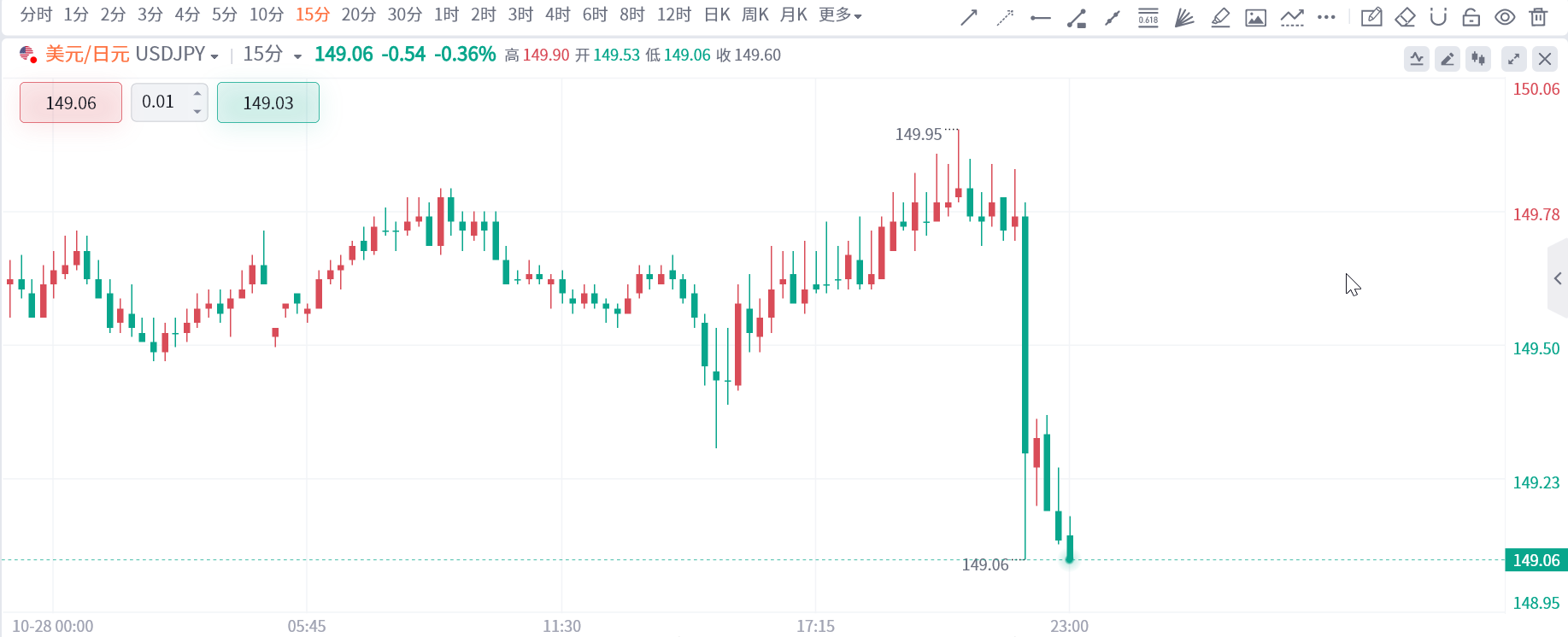The Bank of Japan may take action against YCC again after three months! The yen's decline ushered in a "bleeding patch"
According to Nikkei Index reports, people familiar with the matter revealed that the Bank of Japan will consider further adjustments to its yield curve control (YCC) framework at the monetary policy meeting on Tuesday, which may allow the yield on Japan's 10-year treasury bonds to rise above 1%. Affected by this news, the dollar continued to fall against the yen and is currently approaching the 149 mark.

The Bank of Japan limits long-term interest rates below 1% through unlimited fixed-rate purchases. This latest cap was introduced in July to replace the previous 0.5% cap.
Against the backdrop of rising US interest rates, the yield on Japan's 10-year treasury bonds is approaching 1%, so it seems generally considered necessary to adjust YCC for the second time in three months.
Sources said that the Bank of Japan may also be more flexible in purchasing Japanese treasury bonds. This move, along with a more flexible 10-year yield cap, aims to deter speculators from targeting the upper limit and prevent the Bank of Japan from buying large amounts of Japanese treasury bonds to keep yields below 1%.

Japan's long-term interest rates rose faster than the central bank expected in July. On Monday, the yield on newly issued 10-year treasury bonds reached 0.89%, the highest level since July 2013, and is close to the 1% limit stated by Bank of Japan Governor Kazuo Ueda.
This is happening against the backdrop of rising long-term interest rates in the US. Federal Reserve Chairman Powell said on October 19 that if rapid economic growth and labor shortages continue, US interest rates may rise again. Powell said at the time that these trends “may justify further tightening of monetary policy.”
His statement “threw cold water on” the expectation that the Federal Reserve would soon stop raising interest rates. As people realized that Powell would continue to tighten policy, the 10-year US Treasury yield surpassed 5% for the first time in 16 years.
Another trend could also influence the Bank of Japan's decision. The government is wary of yen depreciation because it will increase inflation. Due to the widening spread between the US and Japan, the exchange rate of the yen fell below 150 again after a period of 1 year against the US dollar.
If the Bank of Japan manages to curb the rise in long-term interest rates, more capital will flow to a strong dollar, which may cause the yen to depreciate further. However, if the Bank of Japan adjusts its YCC framework and allows long-term interest rates to rise to higher levels, it could stop the yen from falling.
There is a risk of re-adjusting YCC only three months after the last time it was adjusted. Long-term interest rates are likely to rise far beyond the Bank of Japan's ability to afford, forcing the central bank to buy large amounts of government bonds to limit damage to the economy.
The Bank of Japan will also announce its policy committee members' median inflation and growth forecasts on Tuesday. It is likely to raise its forecast for core CPI (excluding fresh food). Currently, it expects a core CPI of 2.5% for the fiscal year ending March 2024 and 1.9% for the next fiscal year. If the Bank of Japan raises its forecast for the core CPI for the 2024 fiscal year to 2%, this will mark the inflation rate above 2% for three consecutive years, close to the Bank of Japan's goal of maintaining a 2% inflation rate.
 Index Options
Index Options CME Group
CME Group Nasdaq
Nasdaq Cboe
Cboe TradingView
TradingView Wall Street Journal
Wall Street Journal